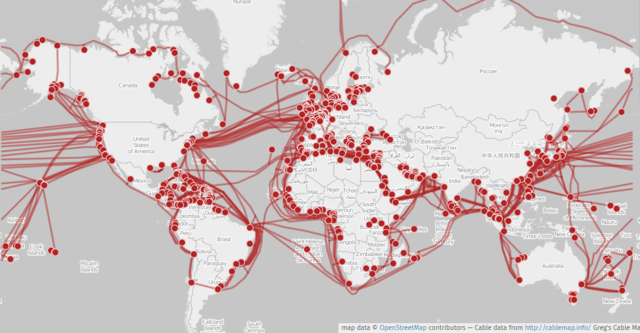Subsea Cables Part II – Mind the Sharks

State of (Cyber)War Episode 7.2
Welcome to the second of our two-part edition on underwater communications cables. Hugo Tarrida and John Salomon discuss the current threat environment facing global underwater data links, motivations of actors, legal frameworks protecting these cables, and more.
Notes and Links:
Part I of this two-part discussion is located here (video) and here (notes).
As with all our talks, this is purely based on our own (limited) knowledge and expertise, and a lot of open source intelligence and publicly available material. Feel free to direct any corrections, insults, and additional information to the various comment sections.
01:58 The Hague Convention (III) relative to the Opening of Hostilities specifies how to do this. We could not find an instructional video on YouTube. https://ihl-databases.icrc.org/pt/ihl-treaties/hague-conv-iii-1907
04:14 For example, in 2005, Chad declared war on Sudan, or rather, “a state of belligerence”. That said, Chad is a Francophone country so maybe there’s a translation question. Today we learned. Some details: https://en.wikipedia.org/wiki/Chad%E2%80%93Sudan_relations
05:05 Foreign Policy in June: https://foreignpolicy.com/2024/06/13/russia-sabotage-attacks-europe-espionage-hybrid-arson/
05:13 https://www.politico.eu/article/russia-berlin-fire-diehl-behind-arson-attack-on-factory/
05:17 https://www.ft.com/content/f8207823-f5e1-4caf-934d-67c648f807bf – plus disruption of several lines in France during the 2024 Summer Olympics: https://edition.cnn.com/2024/07/27/europe/france-train-attacks-explainer-2024-paris-olympics-intl/index.html
05:24 https://www.bbc.com/news/articles/cne900k4wvjo
05:30 https://en.wikipedia.org/wiki/Poisoning_of_Alexander_Litvinenko followed by https://en.wikipedia.org/wiki/Poisoning_of_Sergei_and_Yulia_Skripal
05:45 Hoo boy. See https://www.politico.eu/article/germany-poland-sabotage-investigation-nord-stream-pipeline-explosions-ukrainian-suspect-volodymyr-z/ and https://www.reuters.com/world/europe/kremlin-says-germany-is-right-fully-investigate-nord-stream-pipeline-blasts-2024-09-09/
07:20 Interestingly in our anecdotal experience, the people most cautious about starting a shooty war tend to be the actual military. We wonder why.
08:25 Some analysis: https://www.pbs.org/wgbh/frontline/article/the-president-blinked-why-obama-changed-course-on-the-red-line-in-syria/
09:10 Our logic: Russian and Chinese strategic communications are likely to be primarily overland, possibly via satellite. While especially China has significant overseas involvement and would be hurt to a large degree by a cut in communications to its allies, foreign markets, and suppliers, this overseas interconnectivity is nowhere near as strategically vital as, say, that of the US and other FVEY countries, Japan, or Europe. The same holds at much smaller scale for Iran, North Korea, and other states that are adversarial towards “the West”.
10:45 Arguably there is the little bitty topic of Russian influence operations, especially through German far right parties…
12:10 Well, here’s another thing that changed quite a bit in between recording and editing this video…
13:25 There have been multiple cuts over the past years, several in 2024 alone, e.g. https://blog.cloudflare.com/east-african-internet-connectivity-again-impacted-by-submarine-cable-cuts/
14:45 The OG of relevant international accords is that 1884 International Convention for the Protection of Submarine Telegraph Cables (Paris Convention): https://cil.nus.edu.sg/wp-content/uploads/2019/02/1884-Convention-for-the-Protection-of-Submarine-Telegraph-Cables-1.pdf (PDF) -currently there are various conventions including UNCLOS that incorporates multiple convention treating subsea cable damage or sabotage.
14:55 https://www.un.org/depts/los/convention_agreements/texts/unclos/unclos_e.pdf (PDF)
15:00 https://www.theguardian.com/world/2016/jul/12/philippines-wins-south-china-sea-case-against-china
15:30 We are not lawyers, but from reading some of these treaties, it sounds like as long as you’re not “damaging” cables, it’s…”legal”?
22:27 We haven’t even begun talking about potential threats to such a critical piece of communications infrastructure from the company and its management itself, acting in bad faith…
22:52 There are a number of parts to this, for example GOVSATCOM at https://www.european-space-law.com/GOVSATCOM.html and the proposed plan for space-based secure communications: https://commission.europa.eu/strategy-and-policy/priorities-2019-2024/europe-fit-digital-age/space-eu-initiatives-satellite-based-connectivity-system-and-eu-approach-management-space-traffic_en – At least some of this activity falls under the EU Space Strategy for Security and Defence: https://defence-industry-space.ec.europa.eu/eu-space/eu-space-strategy-security-and-defence_en
23:08 Not strictly about satellite communications security, but highly relevant: https://cybersecurityadvisors.network/2023/11/23/the-growing-threat-of-quantum-supremacy-in-the-era-of-digital-civilization/
24:00 More broadly, here’s a paper discussing the space and satellite aspect of the Ukraine war: https://www.airuniversity.af.edu/Portals/10/AEtherJournal/Journals/Volume-3_Number-1/Dickey_Gleason.pdf (PDF)
24:30 Apparently Starlink relies on a fairly distributed array of ground stations. Here is an overview: https://starlinkspot.com/starlink-ground-station-locations/
25:15 https://en.wikipedia.org/wiki/2007_Chinese_anti-satellite_missile_test
25:32 https://en.wikipedia.org/wiki/Kessler_syndrome
26:30 For the anime nerds, the series “Planetes” is actually a really good hard sci-fi treatment of the topic of space debris. Worth a watch.
27:40 There are various different figures, but most seem to agree on 95% or more of the world’s data traffic passing via subsea cables at some point, for example: https://www.enisa.europa.eu/news/dive-into-the-deep-sea-a-view-of-the-subsea-cable-ecosystem
28:40 Loon LLC, which appears to have failed: https://en.wikipedia.org/wiki/Loon_LLC
You can find CyAN’s Secure-in-Mind YouTube channel at https://youtube.com/@cybersecadvisors – and of course, our videos about cyber conflict on the State of (Cyber)War playlist here. All of our episodes are also available in audio format on Apple iTunes, Amazon Audible, Podcast Republic, Spotify, and Libsyn – links on our Media page.